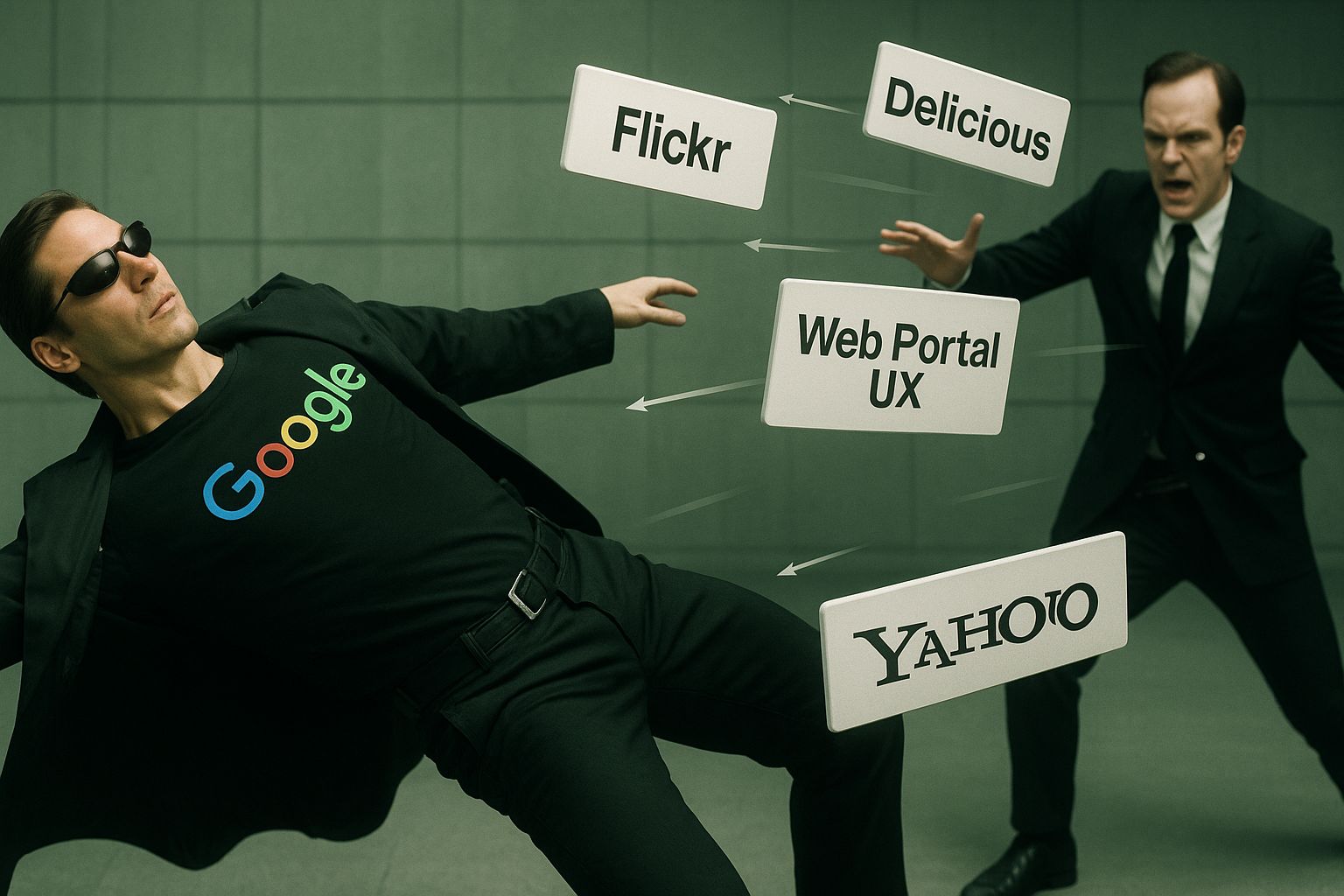- Strategy Wars
- Posts
- The $45 Billion Mistake That Built Google's Empire
The $45 Billion Mistake That Built Google's Empire
How Yahoo's arrogance and six fatal blunders handed two Stanford nerds a search monopoly — and created the most expensive 'what if' in business history.

📜 WAR BRIEFING
Google Vs. Yahoo

Remember when “logging on” meant waiting for a dial‑up modem to stop screeching and Yahoo’s homepage looked like a bunch of yard‑sale signs?
Then along came two Stanford geeks with a search engine so blank it could double as minimalist art (think that weird duct‑taped banana).
They offered it to Yahoo for pocket change (about a million bucks) and were told, “search is only six percent of our business…”
That shrug became one of the biggest “oops” in tech history.
Google went from being Yahoo’s subcontractor to its executioner, proving that focus beats clutter and chasing shiny objects can be fatal.
Today’s battle is about how Google’s strategic thinking overtook Yahoo’s stubbornness and turned it into the massive monopoly we know today.
📡 A MESSAGE FROM OUR ALLIES
Scale Smarter with The Path 🚀
The Entrepreneur’s Growth Platform
If you’re tired of trying to scale your business alone — we built this for you.
🧠 The Path gives you:
✅ Weekly expert-led strategy calls
✅ On-demand marketing & business courses
✅ Monthly challenges, sprints & execution plans
✅ Templates, tools, and proven funnels
✅ A community of sharp, supportive entrepreneurs
💥 Whether you’re stuck at six figures or sprinting to seven — The Path helps you grow faster, with less guesswork.

📊 INTEL REPORT
Missed Bets & Early Blunders

Before Google became the all‑seeing eye of the internet, Larry Page and Sergey Brin were two grad students hawking their search project for about a million bucks.
When they pitched it to Yahoo’s co‑founder, David Filo, but he shrugged and said search was only 6 % of Yahoo’s business.
Twice, Yahoo had a chance to buy Google; twice it balked.
Talk about leaving a winning lottery ticket on the sidewalk.
Ironically, Yahoo then outsourced search to the very company it had just dismissed, plastering Google’s search results under its own.
The partnership made Google a household name while lulling Yahoo into complacency.
By the time Yahoo tried to build its own engine and end the deal in 2004, Google had already sprinted ahead.
Let’s break down the good, the bad, and the outright stupid in this classic battle:

1️⃣ Culture Clash: Portal vs Nerd
If Yahoo were a 90s shopping mall, it would’ve been the anchor tenant with newsstands, celebrity gossip kiosks, and stock tickers.
Paul Graham remembers that Yahoo management called product managers “producers” and saw themselves as a media company.
They measured success in page‑views and banner‑ad revenue, not in how good their search actually was.
Programming talent was treated as a commodity; top engineers went elsewhere.
In contrast, Google’s founders built an engineering‑driven culture obsessed with relevance, speed, and a clean UI/UX.
While Yahoo’s homepage morphed into a carnival of portals and personalization options that could overwhelm users… Google stayed spartan — a logo, a box, and the promise of better answers.

2️⃣ Ad Wars: Bids vs Brains
Yahoo’s advertising strategy was forged when it bought GoTo.com (later renamed Overture) which was a pioneer in pay‑per‑click.
Overture’s model was brutally simple: the highest bidder’s ad got the top spot.
Google initially tried a subscription model but quickly adopted PPC and added a twist:
Instead of just who pays most, Google introduced a “quality score,” blending bids with how often users actually clicked on an ad.
Relevant ads could outrank deep pockets.
Overture sued for patent infringement, and in 2004, Google settled by handing Yahoo 2.7 million shares.
The settlement didn’t help…
Google’s ad platform became the cash‑cow that funded moonshots, while Yahoo’s Panama platform arrived late and failed to even put a dent in Google.

3️⃣ Acquisitions: When Buying Isn’t Strategy
Yahoo’s track record of buying the wrong things at the wrong price is legendary.
Not only did it pass on Google twice… they then spent billions on companies it couldn’t integrate.
By 2003 it had spent $1.6 billion on Inktomi and Overture.
In 2006 it lost a $900 million MySpace search‑and‑ad deal to Google, which promptly snapped up YouTube for $1.65 billion.
Analysts whispered that Yahoo was mulling a $1 billion Facebook buy (another near‑miss).
In 2013 Yahoo paid $1.1 billion for Tumblr…
… six years later Automattic bought it off them for less than $3 million… highlighting just how little value Yahoo extracted from its trophy purchase.

4️⃣ Breaches, Rejections & the Fall
While Google scaled to virtual monopoly, Yahoo got hammered.
Two massive hacks (finally disclosed in 2016) revealed that its 2013 breach compromised three billion accounts and a 2014 breach exposed data from more than 500 million accounts.
Trust evaporated.
Lawsuits followed.
Regulators fined the company.
Meanwhile, management turmoil persisted.
Marissa Mayer’s tenure was marked by that $1 billion Tumblr gamble — but also over 50 acquisitions totaling $2.8 billion — all with no cohesive vision.
Insiders said many Yahoo searches were accidental clicks on the portal.
Microsoft’s 2008 offer to buy Yahoo for about $45 billion was rebuffed as “undervaluing” the company.
A decade later Verizon scooped up Yahoo’s core assets for about $4.48 billion.
As of today (mid‑2025), Google controls nearly 90 % of global search market share, while Yahoo languishes at around 1 %.
🧠 STRATEGY STEVE’S INSIGHTS
Winner’s Playbook: How to Win Your Own Search War

So what can we pull from all of this?
Besides the tremendous egos and asinine decisions of key players, I mean.
Here’s What You Can Take From Google:
Stay laser‑focused on your core. Google treated search like oxygen. Yahoo treated it like trash.
Don’t outsource the thing your business lives on.Make engineering a first‑class citizen. It’s said that if you have to sell your marketing isn’t good enough yet… and if you have to market, your product isn’t good enough yet.
Creating the best product is the number one way to differentiate. But you have to consistently make it better.
Hire the best builders and give them room to tinker.Align incentives with your users. Google’s ad model rewarded relevance, not just deep pockets.
Design your business so that doing right by your customers is also how you make money.Keep it simple. A clean interface isn’t just pretty — it forces you to prioritize what matters.
Clear is always better than clever.
Clear is better than cluttered.
If your product feels like a county fair, users will wander off to somewhere calmer.Acquire thoughtfully. Buying a buzz‑y startup isn’t a strategy. Jumping into an industry just because it’s hot today isn’t a strategy.
Look for assets that strengthen your core and have a clear path to integration (Google acquiring YouTube) instead of vanity trophies (like Yahoo acquiring Tumblr).Protect your castle. Security isn’t glamorous until it’s headline news. Invest in it before three billion people need to change their passwords.

Final Verdict:
In the Battle of Search… it’s hard to argue Yahoo won anything beyond an award for “biggest missed opportunity.”
Google’s relentless focus, nerdy culture, and smarter ad economics turned a scrappy project into a verb.
Yahoo, meanwhile, misread the terrain, bet on banner ads and wound up in the history books as a cautionary tale.
But hey — maybe you love a good underdog story?
🎯 FINAL STRATEGIC MOVE
Want To Go Deeper? Here’s How:
1️⃣ The Path — Join our free strategy & coaching group to sharpen your marketing, scale your business, and outmaneuver the competition.
2️⃣ Need a Marketing Playbook — Fast? Book a one-off consultation or bring me in as your Fractional CMO for high-impact, no-BS growth strategies.
3️⃣ Rebrand Like a Billion-Dollar Company. Need a fresh look? We offer done-for-you branding & rebranding services so you can dominate your market.
See you Friday with the battle breakdown. Until then — adapt, strategize, and conquer.
⚔️ Stephen
The Obsessed Strategist
How did you like today's newsletter? |
